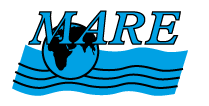A program of the Lawrence Hall of Science that seeks to increase ocean literacy through informal and formal education initiatives
When the Spill Hit Homer
This video portrays the devastating human impact of the Exxon Valdez oil spill. It provides a first-hand account from the perspectives of the residents of Prince William Sound and nearby Alaskan Native villages, which rely on the sea for their subsistence.
Where Have All the Dolphins Gone?
Over 6 million dolphins have been killed in the last 30 years as a direct consequence of the tuna industry`s "purse seine" fishing techniques that entrap dolphins. The film also shows the beauty and grace of our aquatic relatives, and what can be done to stop the killing. Included are dramatic interviews with several of America's most well-respected whale biologists, and the now famous footage of fishing operations shot undercover on a tuna boat by environmentalist Sam LaBudde.
Where Have All the Dolphins Gone?
In the last 30 years, the dolphin world has been devastated by the tuna industry, which continues to use the deadly "purse seine" nets that needlessly entrap dolphins. Over 6 million spinner, spotted, and common dolphins have been killed by U.S. and foreign fishing fleets. Relentless, widespread destruction is pushing some dolphin communities to the brink of extinction. Where Have All the Dolphins Gone?
World Alive
The wonder of life: The splendor of birth and growth, the grace of motion, the drama of survival, the beauty of courtship and renewal. This video profiles the myriad creatures of the planet, their activities and interactions.
Worlds Below
A wondrous video journey into the undersea worlds of California's Monterey Bay. Six lyrical compositions of images and music transport you from wave-swept rocks, across the cast submerged plains, and into the mysterious dark depths of the Monterey Canyon.
Slugs at Sea
The Slugs sing about ocean habitats! This recording was produced in cooperation with the Oceanic Society and follows the MARE Ocean Immersion K-8 curriculum. It's perfect for teachers who present units in marine studies. Each song relates to a different marine habitat that is studied in the curriculum: Songs include:
TIDEPOOL BOOGIE *
LIFE ON THE SHORE *
BUTTS UP *
GIANT KELP FOREST *
WATER CYCLE BOOGIE *
BLUE PLANET *
ISLAND ROCK *
ESTUARY LIFE *
OCEAN RAP *
Water Insects
Describes the physical characteristics, behavior, and life cycles of some insects that spend most of their lives in the water.
The Lawrence Hall of Science Programs for Schools & Community Groups offer several programs for school sites and at the Hall. Assemblies: Dazzling science-on-stage presentations that involve your enthusiastic audience. Perfect for large groups. Workshops: Every student becomes a scientist, immersed in innovative, hands-on science and math activities. Choose from dozens of workshops for all grades in earth science, life science, math, computers, and physical science. Festivals: Involve the whole school community in science and math learning. Great for your open house or school fair.
The Lawrence Hall of Science Programs for Schools & Community Groups offer several programs for school sites and at the Hall. Assemblies: Dazzling science-on-stage presentations that involve your enthusiastic audience. Perfect for large groups. Workshops: Every student becomes a scientist, immersed in innovative, hands-on science and math activities. Choose from dozens of workshops for all grades in earth science, life science, math, computers, and physical science. Festivals: Involve the whole school community in science and math learning. Great for your open house or school fair.
Larvae Page from Stony Brook University
Many invertebrates, amphibians and fishes hatch from their eggs and look nothing like they will as adults. Before becoming adults these animals must metamorphose to take on their adult characteristics. This first stage outside the egg is called the larval stage. Stony Brook University's website contains amazing images of all sorts of larvae you may find floating in our ponds or ocean.
Pages




